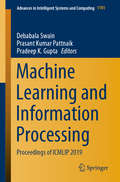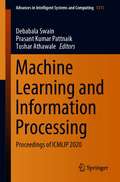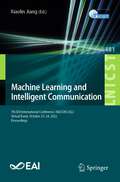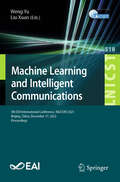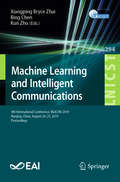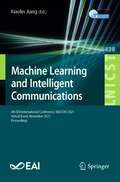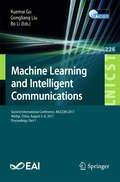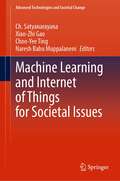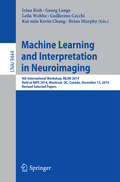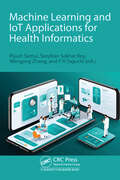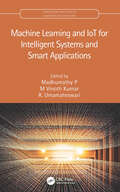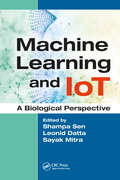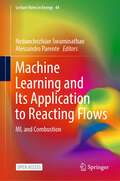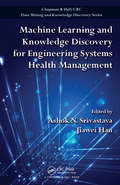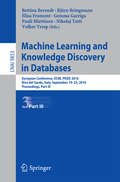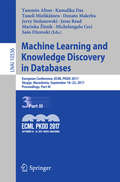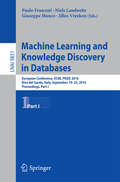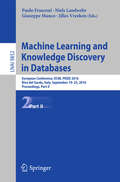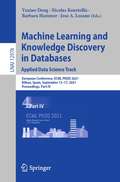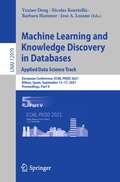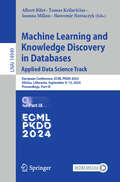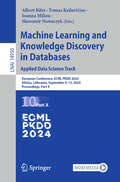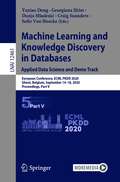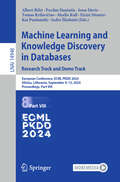- Table View
- List View
Machine Learning and Information Processing: Proceedings of ICMLIP 2019 (Advances in Intelligent Systems and Computing #1101)
by Prasant Kumar Pattnaik Debabala Swain Pradeep K. GuptaThis book includes selected papers from the International Conference on Machine Learning and Information Processing (ICMLIP 2019), held at ISB&M School of Technology, Pune, Maharashtra, India, from December 27 to 28, 2019. It presents the latest developments and technical solutions in the areas of advanced computing and data sciences, covering machine learning, artificial intelligence, human–computer interaction, IoT, deep learning, image processing and pattern recognition, and signal and speech processing.
Machine Learning and Information Processing: Proceedings of ICMLIP 2020 (Advances in Intelligent Systems and Computing #1311)
by Prasant Kumar Pattnaik Debabala Swain Tushar AthawaleThis book includes selected papers from the 2nd International Conference on Machine Learning and Information Processing (ICMLIP 2020), held at Vardhaman College of Engineering, Jawaharlal Nehru Technological University (JNTU), Hyderabad, India, from November 28 to 29, 2020. It presents the latest developments and technical solutions in the areas of advanced computing and data sciences, covering machine learning, artificial intelligence, human–computer interaction, IoT, deep learning, image processing and pattern recognition, and signal and speech processing.
Machine Learning and Intelligent Communication: 7th EAI International Conference, MLICOM 2022, Virtual Event, October 23-24, 2022, Proceedings (Lecture Notes of the Institute for Computer Sciences, Social Informatics and Telecommunications Engineering #481)
by Xiaolin JiangThis book constitutes the refereed post-conference proceedings of the 7th International Conference on Machine Learning and Intelligent Computing which was held in October 2022 in Jinhua, China. Due to COVID-19 pandemic the conference was held virtually. The 16 full papers of MLICOM 2022 were selected from 41 submissions and are clustered in thematical issues on applications of neural network and deep learning; intelligent massive MIMO communications; machine learning algorithms and intelligent networks.
Machine Learning and Intelligent Communication: 8th EAI International Conference, MLICOM 2023, Beijing, China, December 17, 2023, Proceedings (Lecture Notes of the Institute for Computer Sciences, Social Informatics and Telecommunications Engineering #518)
by Weng Yu Liu XuanThis book constitutes the refereed post-conference proceedings of the 8th EAI International Conference on Machine Learning and Intelligent Communication, MLICOM 2023, which was held in Beijing, China, during December 17, 2023. The 18 full papers were carefully reviewed and selected from 44 submissions. They were categorized under the topical sections as follows: Machine Learning and Information Processing, Intelligent Communications Technology, Emerging Artificial Intelligence Application.
Machine Learning and Intelligent Communications: 4th International Conference, MLICOM 2019, Nanjing, China, August 24–25, 2019, Proceedings (Lecture Notes of the Institute for Computer Sciences, Social Informatics and Telecommunications Engineering #294)
by Bing Chen Xiangping Bryce Zhai Kun ZhuThis volume constitutes the refereed post-conference proceedings of the Fourth International Conference on Machine Learning and Intelligent Communications, MLICOM 2019, held in Nanjing, China, in August 2019. The 65 revised full papers were carefully selected from 114 submissions. The papers are organized thematically in machine learning, intelligent positioning and navigation, intelligent multimedia processing and security, wireless mobile network and security, cognitive radio and intelligent networking, IoT, intelligent satellite communications and networking, green communication and intelligent networking, ad-hoc and sensor networks, resource allocation in wireless and cloud networks, signal processing in wireless and optical communications, and intelligent cooperative communications and networking.
Machine Learning and Intelligent Communications: 5th International Conference, MLICOM 2020, Shenzhen, China, September 26-27, 2020, Proceedings (Lecture Notes of the Institute for Computer Sciences, Social Informatics and Telecommunications Engineering #342)
by Zhenyu Na Mingxiang GuanThis volume constitutes the refereed post-conference proceedings of the 5th International Conference on Machine Learning and Intelligent Communications, MLICOM 2020, held in Shenzhen, China, in September 2020. Due to COVID-19 pandemic the conference was held virtually. The 55 revised full papers were carefully selected from 133 submissions. The papers are organized thematically in intelligent resource ( spectrum, power) allocation schemes; applications of neural network and deep learning; decentralized learning for wireless communication systems; intelligent antennas design and dynamic configuration; intelligent communications; intelligent positioning and navigation systems; smart unmanned vehicular technology; intelligent space and terrestrial integrated networks; machine learning algorithm and Intelligent networks.
Machine Learning and Intelligent Communications: 6th EAI International Conference, MLICOM 2021, Virtual Event, November 2021, Proceedings (Lecture Notes of the Institute for Computer Sciences, Social Informatics and Telecommunications Engineering #438)
by Xiaolin JiangThis volume constitutes the refereed post-conference proceedings of the 6th International Conference on Machine Learning and Intelligent Communications, MLICOM 2021, held in November 2021. Due to COVID-19 pandemic the conference was held virtually. The 28 revised full papers were carefully selected from 58 submissions. The papers are organized thematically in tracks as follows: internet of vehicle communication system; applications of neural network and deep learning; intelligent massive MIMO communications; intelligent positioning and navigation systems; intelligent space and terrestrial integrated networks; machine learning algorithms and intelligent networks; image information processing.
Machine Learning and Intelligent Communications: Second International Conference, MLICOM 2017, Weihai, China, August 5-6, 2017, Proceedings, Part I (Lecture Notes of the Institute for Computer Sciences, Social Informatics and Telecommunications Engineering #226)
by Xuemai Gu Gongliang Liu Bo LiThis two volume set constitutes the refereed post-conference proceedings of the Second International Conference on Machine Learning and Intelligent Communications, MLICOM 2017, held in Weihai, China, in August 2017. The 143 revised full papers were carefully selected from 225 submissions. The papers are organized thematically in machine learning, intelligent positioning and navigation, intelligent multimedia processing and security, intelligent wireless mobile network and security, cognitive radio and intelligent networking, intelligent internet of things, intelligent satellite communications and networking, intelligent remote sensing, visual computing and three-dimensional modeling, green communication and intelligent networking, intelligent ad-hoc and sensor networks, intelligent resource allocation in wireless and cloud networks, intelligent signal processing in wireless and optical communications, intelligent radar signal processing, intelligent cooperative communications and networking.
Machine Learning and Internet of Things for Societal Issues (Advanced Technologies and Societal Change)
by Xiao-Zhi Gao Naresh Babu Muppalaneni Ch. Satyanarayana Choo-Yee TingThis book highlights recent advance in the area of Machine Learning and IoT, and their applications to solve societal issues/problems or useful for various users in the society. It is known that many smart devices are interconnected and the data generated is being analyzed and processed with machine learning models for prediction, classification, etc., to solve human needs in various sectors like health, road safety, agriculture, and education. This contributed book puts together chapters concerning the use of intelligent techniques in various aspects related to the IoT domain from protocols to applications, to give the reader an up-to-date picture of the state-of-the-art on the connection between computational intelligence, machine learning, and IoT.
Machine Learning and Interpretation in Neuroimaging
by Brian Murphy Georg Langs Irina Rish Leila Wehbe Guillermo Cecchi Kai-min Kevin ChangThis book constitutes the revised selected papers from the 4th International Workshop on Machine Learning and Interpretation in Neuroimaging, MLINI 2014, held in Montreal, QC, Canada, in December 2014 as a satellite event of the 11th annual conference on Neural Information Processing Systems, NIPS 2014. The 10 MLINI 2014 papers presented in this volume were carefully reviewed and selected from 17 submissions. They were organized in topical sections named: networks and decoding; speech; clinics and cognition; and causality and time-series. In addition, the book contains the 3 best papers presented at MLINI 2013.
Machine Learning and IoT Applications for Health Informatics
by Pijush Samui Zhang Wengang Sekhar Roy Sanjiban Taguchi Y HThis book brings together leading experts from around the world to explore the transformative potential of Machine Learning (ML) and the Internet of Things (IoT) in healthcare. It provides a platform for studying a future where healthcare becomes more precise, personalized, and accessible for all. The book covers recent advancements that will shape the future of healthcare and how artificial intelligence is revolutionizing disease detection, from analyzing chest X-rays for pneumonia to solving the secrets of our genes. It investigates the transformative potential of smart devices, real-time analysis of heart data, and personalized treatment plan creation. It shows how ML and IoT work and presents real-world examples of how they are leading to earlier and more accurate diagnoses and personalized treatments.Therefore, this edited book will be an invaluable resource for researchers, healthcare professionals, data scientists, or simply someone passionate about the future of healthcare. Readers will discover the exciting possibilities that lie ahead at the crossroads of ML, IoT, and health informatics.
Machine Learning and IoT for Intelligent Systems and Smart Applications (Computational Intelligence in Engineering Problem Solving)
by Madhumathy P.The fusion of AI and IoT enables the systems to be predictive, prescriptive, and autonomous, and this convergence has evolved the nature of emerging applications from being assisted to augmented, and ultimately to autonomous intelligence. This book discusses algorithmic applications in the field of machine learning and IoT with pertinent applications. It further discusses challenges and future directions in the machine learning area and develops understanding of its role in technology, in terms of IoT security issues. Pertinent applications described include speech recognition, medical diagnosis, optimizations, predictions, and security aspects. Features: Focuses on algorithmic and practical parts of the artificial intelligence approaches in IoT applications. Discusses supervised and unsupervised machine learning for IoT data and devices. Presents an overview of the different algorithms related to Machine learning and IoT. Covers practical case studies on industrial and smart home automation. Includes implementation of AI from case studies in personal and industrial IoT. This book aims at Researchers and Graduate students in Computer Engineering, Networking Communications, Information Science Engineering, and Electrical Engineering.
Machine Learning and IoT: A Biological Perspective
by Shampa Sen, Leonid Datta and Sayak MitraThis book discusses some of the innumerable ways in which computational methods can be used to facilitate research in biology and medicine - from storing enormous amounts of biological data to solving complex biological problems and enhancing treatment of various grave diseases.
Machine Learning and Its Application to Reacting Flows: ML and Combustion (Lecture Notes in Energy #44)
by Nedunchezhian Swaminathan Alessandro ParenteThis open access book introduces and explains machine learning (ML) algorithms and techniques developed for statistical inferences on a complex process or system and their applications to simulations of chemically reacting turbulent flows.These two fields, ML and turbulent combustion, have large body of work and knowledge on their own, and this book brings them together and explain the complexities and challenges involved in applying ML techniques to simulate and study reacting flows. This is important as to the world’s total primary energy supply (TPES), since more than 90% of this supply is through combustion technologies and the non-negligible effects of combustion on environment. Although alternative technologies based on renewable energies are coming up, their shares for the TPES is are less than 5% currently and one needs a complete paradigm shift to replace combustion sources. Whether this is practical or not is entirely a different question, and an answer to this question depends on the respondent. However, a pragmatic analysis suggests that the combustion share to TPES is likely to be more than 70% even by 2070. Hence, it will be prudent to take advantage of ML techniques to improve combustion sciences and technologies so that efficient and “greener” combustion systems that are friendlier to the environment can be designed. The book covers the current state of the art in these two topics and outlines the challenges involved, merits and drawbacks of using ML for turbulent combustion simulations including avenues which can be explored to overcome the challenges. The required mathematical equations and backgrounds are discussed with ample references for readers to find further detail if they wish. This book is unique since there is not any book with similar coverage of topics, ranging from big data analysis and machine learning algorithm to their applications for combustion science and system design for energy generation.
Machine Learning and Knowledge Discovery for Engineering Systems Health Management (Chapman And Hall/crc Data Mining And Knowledge Discovery Ser.)
by Jiawei Han Ashok N. SrivastavaThis volume presents state-of-the-art tools and techniques for automatically detecting, diagnosing, and predicting the effects of adverse events in an engineered system. It emphasizes the importance of these techniques in managing the intricate interactions within and between engineering systems to maintain a high degree of reliability. Reflecting the interdisciplinary nature of the field, the book explains how the fundamental algorithms and methods of both physics-based and data-driven approaches effectively address systems health management in application areas such as data centers, aircraft, and software systems.
Machine Learning and Knowledge Discovery in Databases
by Bettina Berendt Björn Bringmann Élisa Fromont Gemma Garriga Pauli Miettinen Nikolaj Tatti Volker TrespThe three volume set LNAI 9851, LNAI 9852, and LNAI 9853 constitutes the refereed proceedings of the European Conference on Machine Learning and Knowledge Discovery in Databases, ECML PKDD 2016, held in Riva del Garda, Italy, in September 2016. The 123 full papers and 16 short papers presented were carefully reviewed and selected from a total of 460 submissions. The papers presented focus on practical and real-world studies of machine learning, knowledge discovery, data mining; innovative prototype implementations or mature systems that use machine learning techniques and knowledge discovery processes in a real setting; recent advances at the frontier of machine learning and data mining with other disciplines. Part I and Part II of the proceedings contain the full papers of the contributions presented in the scientific track and abstracts of the scientific plenary talks. Part III contains the full papers of the contributions presented in the industrial track, short papers describing demonstration, the nectar papers, and the abstracts of the industrial plenary talks.
Machine Learning and Knowledge Discovery in Databases
by Jerzy Stefanowski Donato Malerba Michelangelo Ceci Sašo Džeroski Yasemin Altun Kamalika Das Taneli Mielikäinen Jesse Read Marinka ŽitnikThis three-volume set LNAI 6911, LNAI 6912, and LNAI 6913 constitutes the refereed proceedings of the European conference on Machine Learning and Knowledge Discovery in Databases: ECML PKDD 2011, held in Athens, Greece, in September 2011. The 121 revised full papers presented together with 10 invited talks and 11 demos in the three volumes, were carefully reviewed and selected from about 600 paper submissions. The papers address all areas related to machine learning and knowledge discovery in databases as well as other innovative application domains such as supervised and unsupervised learning with some innovative contributions in fundamental issues; dimensionality reduction, distance and similarity learning, model learning and matrix/tensor analysis; graph mining, graphical models, hidden markov models, kernel methods, active and ensemble learning, semi-supervised and transductive learning, mining sparse representations, model learning, inductive logic programming, and statistical learning. a significant part of the papers covers novel and timely applications of data mining and machine learning in industrial domains.
Machine Learning and Knowledge Discovery in Databases
by Giuseppe Manco Paolo Frasconi Niels Landwehr Jilles VreekenThe three volume set LNAI 9851, LNAI 9852, and LNAI 9853 constitutes the refereed proceedings of the European Conference on Machine Learning and Knowledge Discovery in Databases, ECML PKDD 2016, held in Riva del Garda, Italy, in September 2016. The 123 full papers and 16 short papers presented were carefully reviewed and selected from a total of 460 submissions. The papers presented focus on practical and real-world studies of machine learning, knowledge discovery, data mining; innovative prototype implementations or mature systems that use machine learning techniques and knowledge discovery processes in a real setting; recent advances at the frontier of machine learning and data mining with other disciplines. Part I and Part II of the proceedings contain the full papers of the contributions presented in the scientific track and abstracts of the scientific plenary talks. Part III contains the full papers of the contributions presented in the industrial track, short papers describing demonstration, the nectar papers, and the abstracts of the industrial plenary talks.
Machine Learning and Knowledge Discovery in Databases
by Giuseppe Manco Paolo Frasconi Niels Landwehr Jilles VreekenThe three volume set LNAI 9851, LNAI 9852, and LNAI 9853 constitutes the refereed proceedings of the European Conference on Machine Learning and Knowledge Discovery in Databases, ECML PKDD 2016, held in Riva del Garda, Italy, in September 2016. The 123 full papers and 16 short papers presented were carefully reviewed and selected from a total of 460 submissions. The papers presented focus on practical and real-world studies of machine learning, knowledge discovery, data mining; innovative prototype implementations or mature systems that use machine learning techniques and knowledge discovery processes in a real setting; recent advances at the frontier of machine learning and data mining with other disciplines. Part I and Part II of the proceedings contain the full papers of the contributions presented in the scientific track and abstracts of the scientific plenary talks. Part III contains the full papers of the contributions presented in the industrial track, short papers describing demonstration, the nectar papers, and the abstracts of the industrial plenary talks.
Machine Learning and Knowledge Discovery in Databases. Applied Data Science Track: European Conference, ECML PKDD 2021, Bilbao, Spain, September 13–17, 2021, Proceedings, Part IV (Lecture Notes in Computer Science #12978)
by Barbara Hammer Yuxiao Dong Jose A. Lozano Nicolas KourtellisThe multi-volume set LNAI 12975 until 12979 constitutes the refereed proceedings of the European Conference on Machine Learning and Knowledge Discovery in Databases, ECML PKDD 2021, which was held during September 13-17, 2021. The conference was originally planned to take place in Bilbao, Spain, but changed to an online event due to the COVID-19 pandemic. The 210 full papers presented in these proceedings were carefully reviewed and selected from a total of 869 submissions. The volumes are organized in topical sections as follows: Research Track: Part I: Online learning; reinforcement learning; time series, streams, and sequence models; transfer and multi-task learning; semi-supervised and few-shot learning; learning algorithms and applications. Part II: Generative models; algorithms and learning theory; graphs and networks; interpretation, explainability, transparency, safety. Part III: Generative models; search and optimization; supervised learning; text mining and natural language processing; image processing, computer vision and visual analytics. Applied Data Science Track: Part IV: Anomaly detection and malware; spatio-temporal data; e-commerce and finance; healthcare and medical applications (including Covid); mobility and transportation. Part V: Automating machine learning, optimization, and feature engineering; machine learning based simulations and knowledge discovery; recommender systems and behavior modeling; natural language processing; remote sensing, image and video processing; social media.
Machine Learning and Knowledge Discovery in Databases. Applied Data Science Track: European Conference, ECML PKDD 2021, Bilbao, Spain, September 13–17, 2021, Proceedings, Part V (Lecture Notes in Computer Science #12979)
by Barbara Hammer Yuxiao Dong Jose A. Lozano Nicolas KourtellisThe multi-volume set LNAI 12975 until 12979 constitutes the refereed proceedings of the European Conference on Machine Learning and Knowledge Discovery in Databases, ECML PKDD 2021, which was held during September 13-17, 2021. The conference was originally planned to take place in Bilbao, Spain, but changed to an online event due to the COVID-19 pandemic. The 210 full papers presented in these proceedings were carefully reviewed and selected from a total of 869 submissions. The volumes are organized in topical sections as follows: Research Track: Part I: Online learning; reinforcement learning; time series, streams, and sequence models; transfer and multi-task learning; semi-supervised and few-shot learning; learning algorithms and applications. Part II: Generative models; algorithms and learning theory; graphs and networks; interpretation, explainability, transparency, safety. Part III: Generative models; search and optimization; supervised learning; text mining and natural language processing; image processing, computer vision and visual analytics. Applied Data Science Track: Part IV: Anomaly detection and malware; spatio-temporal data; e-commerce and finance; healthcare and medical applications (including Covid); mobility and transportation. Part V: Automating machine learning, optimization, and feature engineering; machine learning based simulations and knowledge discovery; recommender systems and behavior modeling; natural language processing; remote sensing, image and video processing; social media.
Machine Learning and Knowledge Discovery in Databases. Applied Data Science Track: European Conference, ECML PKDD 2024, Vilnius, Lithuania, September 9–13, 2024, Proceedings, Part IX (Lecture Notes in Computer Science #14949)
by Albert Bifet Slawomir Nowaczyk Ioanna Miliou Tomas KrilavičiusThis multi-volume set, LNAI 14941 to LNAI 14950, constitutes the refereed proceedings of the European Conference on Machine Learning and Knowledge Discovery in Databases, ECML PKDD 2024, held in Vilnius, Lithuania, in September 2024. The papers presented in these proceedings are from the following three conference tracks: - Research Track: The 202 full papers presented here, from this track, were carefully reviewed and selected from 826 submissions. These papers are present in the following volumes: Part I, II, III, IV, V, VI, VII, VIII. Demo Track: The 14 papers presented here, from this track, were selected from 30 submissions. These papers are present in the following volume: Part VIII. Applied Data Science Track: The 56 full papers presented here, from this track, were carefully reviewed and selected from 224 submissions. These papers are present in the following volumes: Part IX and Part X.
Machine Learning and Knowledge Discovery in Databases. Applied Data Science Track: European Conference, ECML PKDD 2024, Vilnius, Lithuania, September 9–13, 2024, Proceedings, Part X (Lecture Notes in Computer Science #14950)
by Albert Bifet Slawomir Nowaczyk Ioanna Miliou Tomas KrilavičiusThis multi-volume set, LNAI 14941 to LNAI 14950, constitutes the refereed proceedings of the European Conference on Machine Learning and Knowledge Discovery in Databases, ECML PKDD 2024, held in Vilnius, Lithuania, in September 2024. The papers presented in these proceedings are from the following three conference tracks: - Research Track: The 202 full papers presented here, from this track, were carefully reviewed and selected from 826 submissions. These papers are present in the following volumes: Part I, II, III, IV, V, VI, VII, VIII. Demo Track: The 14 papers presented here, from this track, were selected from 30 submissions. These papers are present in the following volume: Part VIII. Applied Data Science Track: The 56 full papers presented here, from this track, were carefully reviewed and selected from 224 submissions. These papers are present in the following volumes: Part IX and Part X.
Machine Learning and Knowledge Discovery in Databases. Applied Data Science and Demo Track: European Conference, ECML PKDD 2020, Ghent, Belgium, September 14–18, 2020, Proceedings, Part V (Lecture Notes in Computer Science #12461)
by Dunja Mladenić Georgiana Ifrim Yuxiao Dong Craig Saunders Sofie Van HoeckeThe 5-volume proceedings, LNAI 12457 until 12461 constitutes the refereed proceedings of the European Conference on Machine Learning and Knowledge Discovery in Databases, ECML PKDD 2020, which was held during September 14-18, 2020. The conference was planned to take place in Ghent, Belgium, but had to change to an online format due to the COVID-19 pandemic.The 232 full papers and 10 demo papers presented in this volume were carefully reviewed and selected for inclusion in the proceedings. The volumes are organized in topical sections as follows: Part I: Pattern Mining; clustering; privacy and fairness; (social) network analysis and computational social science; dimensionality reduction and autoencoders; domain adaptation; sketching, sampling, and binary projections; graphical models and causality; (spatio-) temporal data and recurrent neural networks; collaborative filtering and matrix completion. Part II: deep learning optimization and theory; active learning; adversarial learning; federated learning; Kernel methods and online learning; partial label learning; reinforcement learning; transfer and multi-task learning; Bayesian optimization and few-shot learning. Part III: Combinatorial optimization; large-scale optimization and differential privacy; boosting and ensemble methods; Bayesian methods; architecture of neural networks; graph neural networks; Gaussian processes; computer vision and image processing; natural language processing; bioinformatics. Part IV: applied data science: recommendation; applied data science: anomaly detection; applied data science: Web mining; applied data science: transportation; applied data science: activity recognition; applied data science: hardware and manufacturing; applied data science: spatiotemporal data. Part V: applied data science: social good; applied data science: healthcare; applied data science: e-commerce and finance; applied data science: computational social science; applied data science: sports; demo track.
Machine Learning and Knowledge Discovery in Databases. Research Track and Demo Track: European Conference, ECML PKDD 2024, Vilnius, Lithuania, September 9–13, 2024, Proceedings, Part VIII (Lecture Notes in Computer Science #14948)
by Jesse Davis Albert Bifet Eirini Ntoutsi Tomas Krilavičius Meelis Kull Indrė Žliobaitė Povilas Daniušis Kai PuolamäkiThis multi-volume set, LNAI 14941 to LNAI 14950, constitutes the refereed proceedings of the European Conference on Machine Learning and Knowledge Discovery in Databases, ECML PKDD 2024, held in Vilnius, Lithuania, in September 2024. The papers presented in these proceedings are from the following three conference tracks: - Research Track: The 202 full papers presented here, from this track, were carefully reviewed and selected from 826 submissions. These papers are present in the following volumes: Part I, II, III, IV, V, VI, VII, VIII. Demo Track: The 14 papers presented here, from this track, were selected from 30 submissions. These papers are present in the following volume: Part VIII. Applied Data Science Track: The 56 full papers presented here, from this track, were carefully reviewed and selected from 224 submissions. These papers are present in the following volumes: Part IX and Part X.
